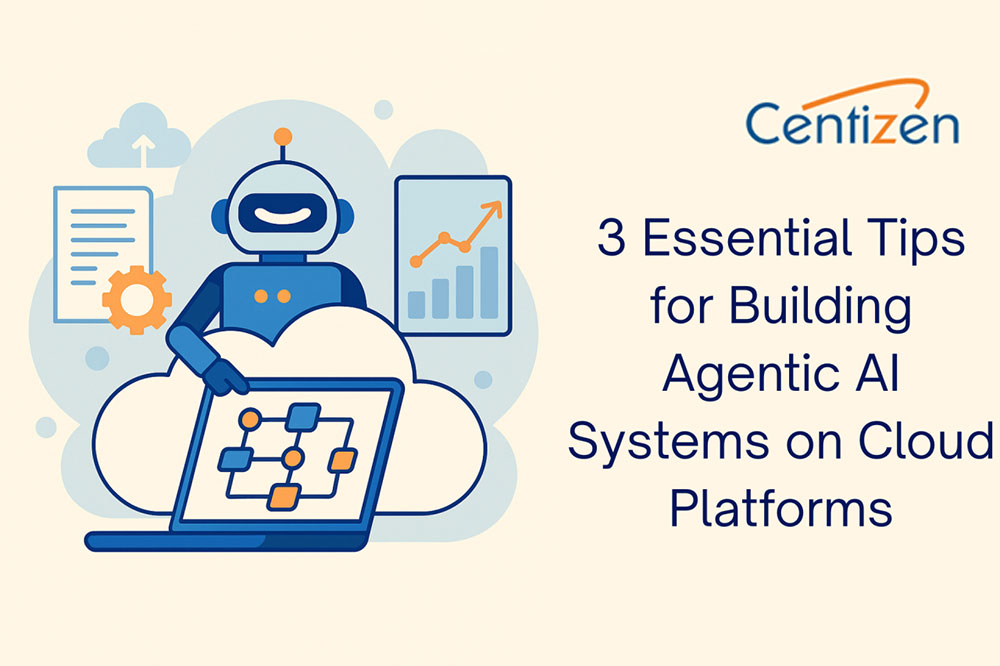3 Essential Tips for Building Agentic AI Systems on Cloud Platforms

Agentic AI is transforming how enterprises operate in the cloud. Unlike traditional automation, these systems act with a high degree of autonomy, making decisions, executing actions, and adapting to changing conditions without constant human oversight. This capability creates enormous business value—whether it’s optimizing infrastructure costs, handling incidents in real time, or dynamically interacting with customers.
But autonomy also introduces risks. Without the right guardrails, agentic AI can cause unpredictable behaviors, cost overruns, or compliance issues. To build safe and effective cloud-based agents, organizations must strike a balance between freedom and control. Here are three practical strategies to maximize the value of agentic AI on AWS, Azure, or Google Cloud Platform.
1. Keep systems on a tight leash
The first step in designing agentic AI is defining clear, policy-driven constraints. Guardrails ensure that autonomous systems act only within approved boundaries.
All major cloud providers offer robust security and control tools:
- IAM (Identity and Access Management) to limit agent permissions.
- Resource tagging to isolate environments.
- Policy engines to enforce conditions for actions.
Example: A SaaS company launched an AI agent to auto-scale compute resources. Misinterpreted telemetry data led to uncontrolled provisioning and soaring costs. The fix? Tighter IAM roles, tagging policies, and budget approval workflows for high-impact actions.
Pro tip: It’s far safer to start with restrictive controls and loosen them later. Always implement:
- Least-privilege access.
- Explicit approval gates for risky operations.
- Rate limits and audit logs for accountability.
2. Choose cloud-native integrations for context and action
Agentic AI thrives on two pillars: fast, accurate context and reliable execution pathways. Treating AI as a bolt-on system is a mistake. Instead, build it as a first-class citizen of your cloud ecosystem.
Key integrations include:
- Event systems like AWS EventBridge or Azure Event Grid to deliver real-time signals.
- Managed workflow services (AWS Step Functions, Azure Logic Apps, GCP Workflows) to orchestrate complex tasks.
- Cloud SDKs and connectors instead of brittle, hand-coded APIs.
Example: An omnichannel retailer built a pricing optimization agent with custom APIs linking inventory, pricing, and alerts. The system was fragile—small API changes broke key functions. Switching to serverless orchestration and native connectors halved maintenance costs and improved resilience.
Takeaway: Focus on intelligence, not plumbing. Cloud-native services evolve faster than custom integrations, keeping your agent future-proof and reducing technical debt.
3. Optimize feedback loops and continuous learning
The defining trait of agentic AI is its capacity to learn and adapt. Feedback loops ensure systems evolve safely and remain aligned with business goals.
Cloud platforms provide powerful telemetry and monitoring tools:
- AWS CloudWatch, Azure Monitor, GCP Cloud Logging for tracking agent actions.
- ML pipelines to retrain models based on real-world outcomes.
- Dashboards and alerts to detect drift or anomalous behavior.
Example: A financial services firm used Azure for AI-driven document processing. By logging all actions and retraining on failure cases, they cut exception rates by 50% in six months. Transparent workflows also reassured compliance teams by proving measurable improvement over time.
Best practice: Treat measurement and retraining as ongoing habits, not afterthoughts. Build telemetry, monitoring, and retraining pipelines into your architecture from day one.
Final thoughts
Agentic AI represents the next frontier of intelligent automation. On cloud platforms, success depends on:
- Tight guardrails that prevent costly mistakes.
- Cloud-native integrations that give agents context and reliable execution paths.
- Continuous feedback loops that ensure learning, trust, and long-term resilience.
When designed thoughtfully, agentic AI becomes a trusted business partner, not a liability. By leveraging the cloud’s strengths—security, scalability, and rapid innovation—enterprises can harness autonomy while staying in control.
Our services:
- Staffing: Contract, contract-to-hire, direct hire, remote global hiring, SOW projects, and managed services.
- Remote hiring: Hire full-time IT professionals from our India-based talent network.
- Custom software development: Web/Mobile Development, UI/UX Design, QA & Automation, API Integration, DevOps, and Product Development.
Our products:
- ZenBasket: A customizable ecommerce platform.
- Zenyo payroll: Automated payroll processing for India.
- Zenyo workforce: Streamlined HR and productivity tools.
Services
Send Us Email
contact@centizen.com
Centizen
A Leading Staffing, Custom Software and SaaS Product Development company founded in 2003. We offer a wide range of scalable, innovative IT Staffing and Software Development Solutions.
Call Us
India: +91 63807-80156
USA & Canada: +1 (971) 420-1700
Send Us Email
contact@centizen.com
Centizen
A Leading Staffing, Custom Software and SaaS Product Development company founded in 2003. We offer a wide range of scalable, innovative IT Staffing and Software Development Solutions.
Call Us
India: +91 63807-80156
USA & Canada: +1 (971) 420-1700
Send Us Email
contact@centizen.com






